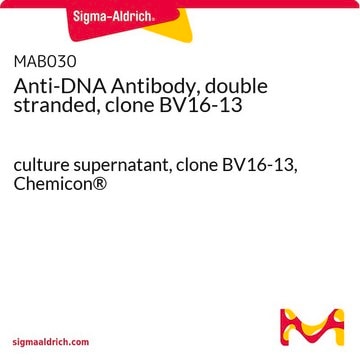04-1540
Anti-PICH Antibody, clone 142-26-3
clone 142-26-3, from mouse
Synonyme(s) :
excision repair cross-complementing rodent repair deficiency, complementation group 6-like, excision repair cross-complementing rodent repair deficiency complementation group 6 - like, Tumor antigen BJ-HCC-15, PLK1-interacting checkpoint helicase, ATP-de
About This Item
Produits recommandés
Source biologique
mouse
Niveau de qualité
Forme d'anticorps
purified immunoglobulin
Type de produit anticorps
primary antibodies
Clone
142-26-3, monoclonal
Espèces réactives
human
Technique(s)
immunocytochemistry: suitable
immunoprecipitation (IP): suitable
western blot: suitable
Isotype
IgG1κ
Numéro d'accès NCBI
Numéro d'accès UniProt
Conditions d'expédition
wet ice
Modification post-traductionnelle de la cible
unmodified
Informations sur le gène
human ... ERCC6L(54821)
Description générale
Spécificité
Immunogène
Application
Immunocytochemistry Analysis: A representative lot was used by an independent laboratory in IC.
Epigenetics & Nuclear Function
Cell Cycle, DNA Replication & Repair
Qualité
Western Blot Analysis: 0.1 µg/mL of this antibody detected Plk1-interacting checkpoint helicase on 10 µg of HeLa-S3 cell lysate.
Description de la cible
Forme physique
Stockage et stabilité
Remarque sur l'analyse
HeLa-S3 cell lysate
Autres remarques
Clause de non-responsabilité
Not finding the right product?
Try our Outil de sélection de produits.
Code de la classe de stockage
12 - Non Combustible Liquids
Classe de danger pour l'eau (WGK)
WGK 1
Point d'éclair (°F)
Not applicable
Point d'éclair (°C)
Not applicable
Certificats d'analyse (COA)
Recherchez un Certificats d'analyse (COA) en saisissant le numéro de lot du produit. Les numéros de lot figurent sur l'étiquette du produit après les mots "Lot" ou "Batch".
Déjà en possession de ce produit ?
Retrouvez la documentation relative aux produits que vous avez récemment achetés dans la Bibliothèque de documents.
Notre équipe de scientifiques dispose d'une expérience dans tous les secteurs de la recherche, notamment en sciences de la vie, science des matériaux, synthèse chimique, chromatographie, analyse et dans de nombreux autres domaines..
Contacter notre Service technique








